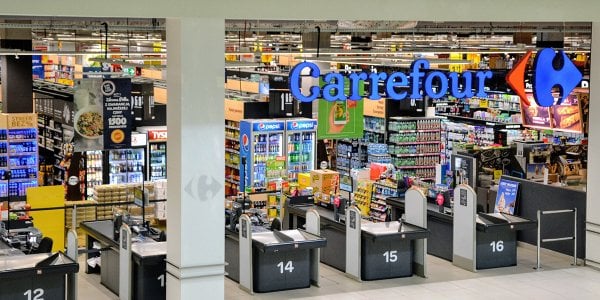Is your favourite supermarket product secretly shrinking? Retailer urges manufacturers to rethink pricing through this bold move!
By
VanessaC
- Replies 13
Have you noticed products have been shrinking in size but maintaining the same price?
If so, you have spotted 'shrinkflation'—a deceptive practice in the consumer goods industry.
But, in a remarkable move that puts pressure on manufacturers, French supermarket giant Carrefour has now begun adding price warning labels to 26 of its products affected by 'shrinkflation'.
The labels read: 'This product has seen its volume or weight fall and the effective price by the supplier rise.'

For those unaware, 'shrinkflation' is when manufacturers start reducing the size of their products but keep selling them for the same (or sometimes higher!) price. It’s a practice that has been happening in Australia and around the world for years, and it’s getting worse. You can learn more about this practice here.
In one example, the price for a sugar-free peach-flavoured Lipton Ice Tea, manufactured by PepsiCo, increased by 40 per cent. Shockingly, the product has decreased in size from 1.5 litres to 1.25 litres.
'Obviously, the aim in stigmatising these products is to be able to tell manufacturers to rethink their pricing policy,' said Stefen Bompais, Carrefour's Director of Client Communications.
The move comes ahead of Carrefour's upcoming contract talks with major brands, which will start soon and end on October 15.
A spokesperson for the company said that it has made a 'concerted effort to compensate for increased costs by increasing efficiency as much as possible' and notes that it has only passed on the costs they could not absorb themself 'in the form of price increases to our customers.'
In a series of videos posted on social media, Neal Chauhan, a 'shrinkflation' expert who has kept his eyes open for supermarket trends, has collected a shocking range of evidence in Australian supermarkets.
Prices for items such as Nescafé, Coke, Glad Wrap and Smiths chips at Coles and Woolworths have stayed the same, but now we’re getting far less for our money—and shoppers are not always being told about the changes.
It’s easy to be angry about companies reducing the sizes of groceries while keeping prices the same. But Neal believes the best way to tackle the issue of ‘shrinkflation’ is with transparency.
You can read more about this story here.
 Have you recently seen a case of ‘shrinkflation' happening in your local supermarket? Share it with us in the comments below!
Have you recently seen a case of ‘shrinkflation' happening in your local supermarket? Share it with us in the comments below!
If so, you have spotted 'shrinkflation'—a deceptive practice in the consumer goods industry.
But, in a remarkable move that puts pressure on manufacturers, French supermarket giant Carrefour has now begun adding price warning labels to 26 of its products affected by 'shrinkflation'.
The labels read: 'This product has seen its volume or weight fall and the effective price by the supplier rise.'

Carrefour made the bold move of placing warning labels on products affected by ‘shrinkflation’. Image source: Shutterstock.
In one example, the price for a sugar-free peach-flavoured Lipton Ice Tea, manufactured by PepsiCo, increased by 40 per cent. Shockingly, the product has decreased in size from 1.5 litres to 1.25 litres.
'Obviously, the aim in stigmatising these products is to be able to tell manufacturers to rethink their pricing policy,' said Stefen Bompais, Carrefour's Director of Client Communications.
The move comes ahead of Carrefour's upcoming contract talks with major brands, which will start soon and end on October 15.
A spokesperson for the company said that it has made a 'concerted effort to compensate for increased costs by increasing efficiency as much as possible' and notes that it has only passed on the costs they could not absorb themself 'in the form of price increases to our customers.'
In a series of videos posted on social media, Neal Chauhan, a 'shrinkflation' expert who has kept his eyes open for supermarket trends, has collected a shocking range of evidence in Australian supermarkets.
Prices for items such as Nescafé, Coke, Glad Wrap and Smiths chips at Coles and Woolworths have stayed the same, but now we’re getting far less for our money—and shoppers are not always being told about the changes.
It’s easy to be angry about companies reducing the sizes of groceries while keeping prices the same. But Neal believes the best way to tackle the issue of ‘shrinkflation’ is with transparency.
You can read more about this story here.
Key Takeaways
- French supermarket chain Carrefour has added price warnings to 26 of its products in an attempt to put pressure on manufacturers to decrease their prices.
- Many of the marked products have seen a decrease in size but an increase in cost, an instance that is known as 'shrinkflation'.
- The labels read: 'This product has seen its volume or weight fall and the effective price by the supplier rise.'
- The application of these labels precedes contract discussions with major brands, which will take place soon.
- Carrefour has stated that they have sought to compensate for increased costs by maximising efficiency wherever possible, passing on only essential price increases to their consumers.







